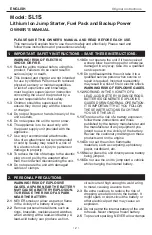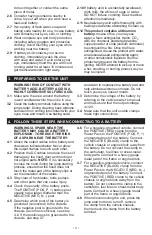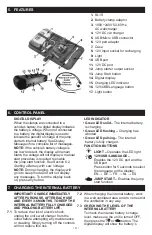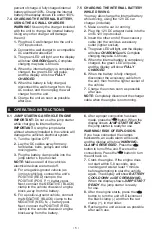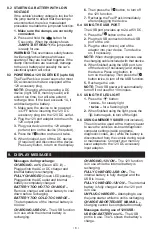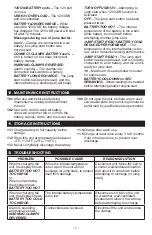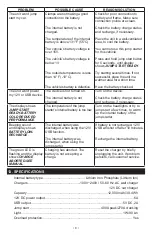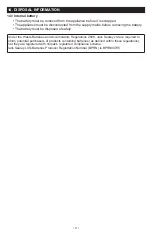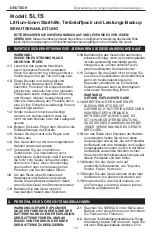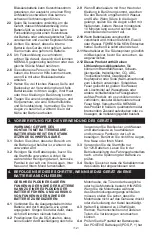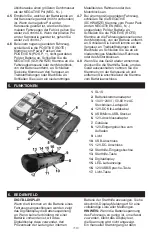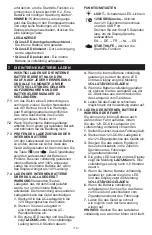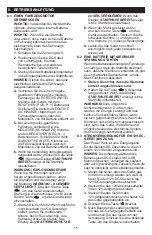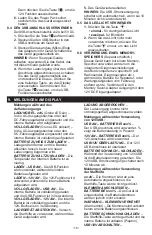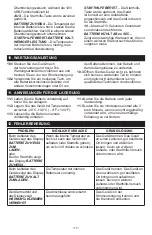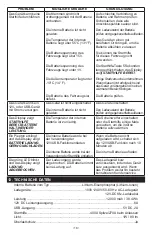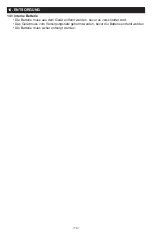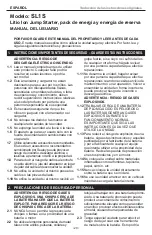
• 5 •
percent of charge. A fully charged internal
battery will read 100%. Charge the internal
battery if the display shows it is under 100%.
7.4 CHARGING THE INTERNAL BATTERY,
USING THE AC WALL CHARGER
WARNING!
Use only the charger included
with the unit to charge the internal battery.
Using any other charger will damage
the unit.
1.
Plug the AC wall charger into the unit’s
12V input socket.
2.
Connect the wall charger to a compatible
AC electrical wall socket.
3.
The green LED will light, and the display
will show
CHARGING-xx%
. Complete
charging may take 4-6 hours.
4.
When the internal battery is completely
charged, the green LED will pulse,
and the display will show
FULLY
CHARGED
.
5.
When the battery is fully charged,
disconnect the wall charger from the
AC socket, and then unplug the wall
charger from the unit.
6.
Charge the unit as soon as possible
after use.
7.5 CHARGING THE INTERNAL BATTERY
WHILE DRIVING
You may also charge the internal battery
while driving, using the 12V DC car
charger (included).
1.
Make sure the car is running.
2.
Plug the 12V DC adaptor cable into the
unit’s 12V input socket.
3.
Insert the other end of the accessory
cable into the vehicle’s accessory
outlet (lighter socket).
4.
The green LED will light, and the display
will show
CHARGING-xx%
. Complete
charging may take 4-6 hours.
5.
When the internal battery is completely
charged, the green LED will pulse,
and the display will show
FULLY
CHARGED
.
6.
When the battery is fully charged,
disconnect the accessory cable from
the unit, then from the lighter socket of
the vehicle.
7.
Charge the unit as soon as possible
after use.
NOTE:
Completely disconnect the charger
cable when the engine is not running.
8. OPERATING INSTRUCTIONS
8.1 JUMP STARTING A VEHICLE ENGINE
IMPORTANT:
Do not use the jump starter
while charging its internal battery.
IMPORTANT:
Using the jump starter
without a battery installed in the vehicle will
damage the vehicle’s electrical system.
1.
Turn the ignition OFF.
2.
Lay the DC cables away from any
fan blades, belts, pulleys and other
moving parts.
3.
Plug the battery clamp cable into the
jump starter’s input socket.
NOTE:
Make sure all of the vehicle’s
electrical devices are turned off.
4.
For a negative-ground vehicle (as
in most vehicles), connect the unit’s
POSITIVE (RED) clamp to the
POSITIVE (POS, P, +) battery post.
Next, connect the NEGATIVE (BLACK)
clamp to the vehicle chassis or engine
block, away from the battery.
5.
For a positive-ground vehicle, connect
the NEGATIVE (BLACK) clamp to the
NEGATIVE (NEG, N, -) battery post.
Next, connect the POSITIVE (RED)
clamp to the vehicle chassis or engine
block away from the battery.
6.
After a proper connection has been
made, press the
button. When the
display shows
JUMP START READY
,
the jump starter is ready for use.
WARNING! RISK OF EXPLOSION.
If you have connected the clamps
backwards, an audio alarm will sound,
and the display will show
WARNING-
CLAMPS REVERSED
. Press the
button to turn off the unit. Reverse the
connections. Press the
button to turn
the unit back on.
7.
Crank the engine. If the engine does
not start within 5-8 seconds, stop
cranking and wait at least 1 minute
before attempting to start the vehicle
again. The display will show
BATTERY
COOL DOWN xx SEC REMAINING.
When the display shows
JUMP START
READY
, the jump starter is ready
for use.
8.
After the engine starts, press the
button to turn the unit off. Disconnect
the black clamp (-) and then the red
clamp (+), in that order.
9.
Recharge the unit as soon as possible
after each use.


